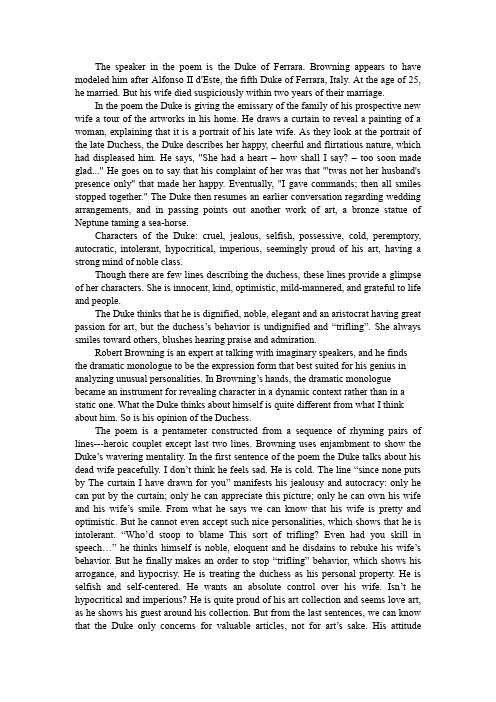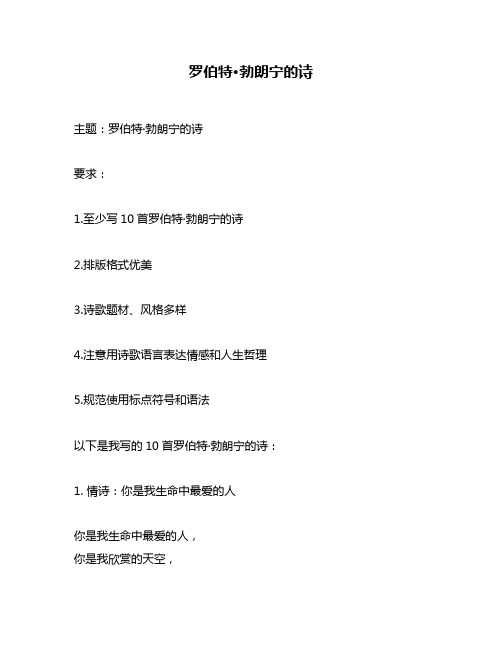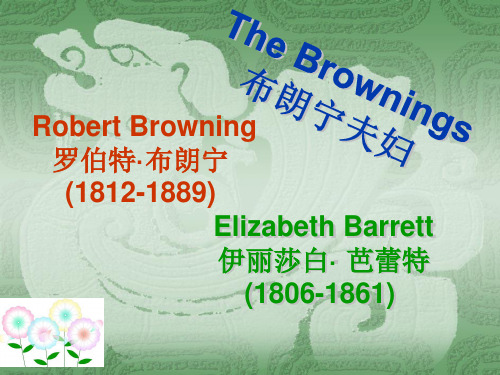诗歌Robert Browning
Robert Browning(1812-1889)

Career
ﻶ1835-1845年间勃朗宁连续发表八部诗剧和诗集
Main works
《戏剧抒情诗》(1842)、《戏剧浪漫诗及抒情诗》 (1845)。在后两部诗集中,诗人创造了别具一格的、 以心理分析为主旨的戏剧独白诗
ﻶ1864年诗集《剧中人物》的出版使勃朗宁加入了英
国诗坛明星的行列。在这部诗集中,诗人进一步发 展和完善了他的“戏剧独白诗”。
ﻶ1868-1869年,勃朗宁晚年的代表作是《指环与书》,
该诗叙述一个老夫杀死少妻的故事。全诗由十二组 戏剧独白组成,每一独白都有主要人物叙述案情, 每人的叙述相互矛盾,但从错综复杂的头绪中最后 露出这起谋杀案的真相。诗歌长达2万余行,虽有冗 长之嫌,但在"戏剧独白"方面达到了最高成就。
•
Dramatic monologue戏剧独白诗: a poem in which there is one imaginary speaker addressing an imaginary audience.
”即使她肯听 Herself be lessoned so, nor plainly set 你这样训诫她而毫不争论毫不为自己辩 Her wits to yours, forsooth, and made excuse, -- E'en then would be some stooping; and I choose 解,——我也觉得 这会有失身份,所以我选择 Never to stoop. Oh, sir, she smiled, no doubt, 绝不屈尊。哦,先生,她总是在微笑, Whene'er I passed her; but who passed without 每逢我走过;但是谁人走过得不到 Much the same smile? This grew; I have commands; Then all smiles stopped together. There she stands 同样慷慨的微笑?发展至此, 我下了令:于是一切微笑都从此制止。 As if alive. Will 't please you rise? We'll meet 她站在那儿,像活着一样。请你起身 The company below then. I repeat, 客人们在楼下等。我再重复一声: The Count your master's known munificence 你的主人——伯爵先生闻名的大方 Is ample warrant that no just pretence 足以充分保证:我对嫁妆 Of mine for dowry will be disallowed; 提出任何合理要求都不会遭拒绝; Though his fair daughter's self, as I avowed 当然.如我开头声明的,他美貌的小姐 At starting, is my object. Nay, we'll go 才是我追求的目标。别客气,让咱们 Together down, sir. Notice Neptune, though, 一同下楼吧。但请看这海神尼普顿 Taming a sea-horse, thought a rarity, 在驯服海马,这是件珍贵的收藏, Which Claus of Innsbruck cast in bronze for me! 是克劳斯为我特制的青铜铸像。
Robert Browning My Last Duchess 赏析

The speaker in the poem is the Duke of Ferrara. Browning appears to have modeled him afterAlfonso II d'Este, the fifth Duke of Ferrara, Italy. At the age of 25, he married. But his wife died suspiciously within two years of their marriage.In the poem the Duke is giving the emissary of the family of his prospective new wife a tour of the artworks in his home. He draws a curtain to reveal a painting of a woman, explaining that it is a portrait of his late wife. As they look at the portrait of the late Duchess, the Duke describes her happy, cheerful and flirtatious nature, which had displeased him. He says, "She had a heart –how shall I say? –too soon made glad..." He goes on to say that his complaint of her was that "'twas not her husband's presence only" that made her happy. Eventually, "I gave commands; then all smiles stopped together." The Duke then resumes an earlier conversation regarding wedding arrangements, and in passing points out another work of art, a bronze statue of Neptune taming a sea-horse.Characters of the Duke: cruel, jealous, selfish,possessive,cold,peremptory, autocratic,intolerant, hypocritical,imperious, seeminglyproud of his art, having a strong mind of noble class.Though there are few lines describing the duchess, these lines provide a glimpse of her characters.She is innocent, kind, optimistic,mild-mannered, and grateful to life and people.The Duke thinks that he is dignified, noble, elegant andan aristocrat having great passion for art, but the duchess’s behavior is undignified and “trifling”. She always smiles toward others, blushes hearing praise and admiration.Robert Browning is an expert at talking with imaginary speakers, and he finds the dramatic monologue to be the expressionform that best suited for his genius in analyzing unusual personalities. In Browning’s hands, the dramatic monologue becamean instrument for revealing character in a dynamic context ratherthan in a static one. What the Duke thinks about himself is quite different from what I think about him. So is his opinion of the Duchess.The poem is a pentameter constructed from a sequence of rhyming pairs of lines---heroic couplet except last two lines. Browning uses enjambment to show the Duke’s wavering mentality. In the first sentence of the poem the Duke talks about his dead wife peacefully. Idon’t think he feels sad. He is cold. The line “since none puts by The curtain I have drawn for you” manifests his jealousy and autocracy: only he can put by the curtain; only he can appreciate this picture; only he can own his wife and his wife’s smile.From what he says we can know that his wife is pretty and optimistic. But he cannot even accept such nice personalities, which shows that he is intolerant.“Who’d stoop to blame This sort of trifling? Even had you skill in speech…”he thinks himself is noble, eloquent and he disdains to rebuke his wife’s behavior. But he finally makes an order to stop “trifling”behavior, which shows his arrogance, and hypocrisy. He is treating the duchess as his personal property. He is selfish and self-centered.He wants an absolute control over his wife. Isn’t he hypocritical and imperious? He is quite proud of his art collection and seems love art, as he shows his guest around his collection. But from the last sentences, we can know that the Duke only concerns for valuable articles, not for art’s sake. His attitude toward art is notsincere. And the paint of his wife is not a painting in memory of her, but just one of the collections which he can show to others.Just after talking about his late wife, the Duke then resumes an earlier conversation regarding wedding arrangements, whichproves his ruthlessness and greed for money. Maybe also he wants to indicate that he expects his new wife a “dignified” one, or else she may have the same fate as the late Duchess.“his fair daughter…is my object.”here “object”is a pun: it means aims or purpose, and physical object, something not alive.Female in the Duke’s eyes is materialized, just like the paint, the dowry, the Neptune, the Taming a sea-horse.As for the duchess, she is not trifling as the Duke thinks. The words from the painters “called that spot of joy”. She is pure, innocent, and bashful. “she liked whate’er she looked on, and her looks went everywhere.”“the dropping of the daylight in the West”, “ the bough of cherries”“the white mule she rode with” make her blush. She loves nature and life. “not plainly set Herself wits to yours, forsooth, and made excuse” she is mild-mannered.“she smiled, no doubt, Whene’erI passed her; but who passed without Much the same smile?The Duchess smiles to everyone passing her without discrimination, which shows her enthusiasm.T he line“all smiles stopped together”may manifest the duchess’s death. Peoplebelieve that the duke has killed the duchess. However, whenBrowning was asked about the final fate of the duchess, he firstly said“yes, the demand is to kill the duchess.”After a while,he turned his answer into that “perhaps the Duke will imprisonthe duchess in a convent.”T here is no need for Browning to tell us what on earth happened to the Duchess, there is no right or the ultimate explanation existing but the readers’ self-exploration. We can formulate a viable interpretation of the poem. As Browning once put it “The creation of the poem is to reside the infinite into thefinite.”Browning didn’t tell us what happened to the Duchess, but he did depict some characteristic of the Italian Renaissance, though it was not purport to show the view of marriage or something else during the Renaissance. The Italian Renaissance was the earliest manifestation of the general European Renaissance, a period of great cultural change and achievement that began in Italy during the 14th century and lasted until the 16th century. In that period of time, magnificent art can be created, as in the poem the paint of the Duchess, and Neptune.At that time, noble class like the Duke still exercised absolute power. But the Duchess’s attitude towards the nobles reflects that she stands for the democracy influenced by the Renaissance (against the capitalist class). It is worth mentioning the Dowry Funds System. Dowry had social and symbolic function. The scale of dowry shown the identity and status of the couple and the honor the bride’s family deserved.Although in his early years, his works got few attentions, he had come to be regarded as one of the most important poets of the Victorian period. In a Browning monologue, unlike a soliloquy, the meaning is not what the speaker voluntarily reveals but what he inadvertently gives away, usually while rationalising past actions or special pleading his case to a silent auditor.These monologues greatly influenced many later poets, including T.S Eliot and Ezra Pound.Reference:/wiki/Robert_Browning#Further_reading /wiki/My_Last_Duchess Deconstructing the Duke and the Duchess in “My Last Duchess”。
Robert Browning Home Thoughts from Abroad 诗歌赏析

Works
Pauline (1833)《波林》 Paracelsus (1835)《巴拉塞尔士》 Strafford (1837) 《斯特拉福》 Pippa Passes (1841) 《比芭之歌》 Dramatic Lyrics (1842) 《戏剧抒情诗》 My Last Duchess (1842) 《我已故的公爵夫人》 Bells and Pomegranates (1841-1846) 《铃铛与石榴》 Dramatic Romances and Lyrics (1845) 《喜剧罗曼史和抒情诗》 Home-Thoughts, from Abroad (1845) 《异域思乡》 Men and Women (1855) 《男人和女人》 Dramatis Personae (1864) 《戏剧人物》 The Ring and the Book (1868) 《指环与书》
19th century (Victorian) British Poets
Greatest contribution to English
poetry:dramatic monologue(戏剧独白诗)
Dispute with: Alfred Tennyson Influenced by:Percy Bysshe Shelley Wife:Elizabeth Barrett Browning
E
Visual images Hark! where my blossomed pear-tree in the hedge
F
The more even metrical pattern and more drawn-out rhyme plan allow for a
Pentameter Leans to the field and scatters on the clover
罗伯特·勃朗宁的诗

罗伯特·勃朗宁的诗主题:罗伯特·勃朗宁的诗要求:1.至少写10首罗伯特·勃朗宁的诗2.排版格式优美3.诗歌题材、风格多样4.注意用诗歌语言表达情感和人生哲理5.规范使用标点符号和语法以下是我写的10首罗伯特·勃朗宁的诗:1. 情诗:你是我生命中最爱的人你是我生命中最爱的人,你是我欣赏的天空,你是我所看到的阳光,你是我爱的所有。
2. 社会诗:我们应该反抗压迫我们应该反抗压迫,为自由,为人权,我们应该谴责压迫者,让压迫不再存在。
3. 发现自我诗:我成为了我想成为的人我成为了我想成为的人,我跨过了一切阻碍,我找到了自己的方向,我站在自己前面的路上。
4. 呼吁和平诗:停止战争,传递爱停止战争,传递爱,让我们和平和睦,不要让战争摧毁我们的未来,我们需要生活在和平中。
5. 爱情诗:我深深地爱你我深深地爱你,我的心每一秒钟都在想你,我知道我们的爱是真实的,有你的世界,我才完整。
6. 献给母亲的诗:母亲,你是我的天使母亲,你是我的天使,你是我人生中的指南针,我的生命因有你而美好,在我最困难的时刻,你一直是我的支持者。
7. 生命哲理诗:生命是一场旅程生命是一场旅程,我们有时会跌倒,有时会失去方向,但我们必须坚持前进。
8. 离别诗:虽然我要离开,但我的心永远在你那里虽然我要离开,但我的心会留在你那里,我会想念你的微笑和温暖,直到我们再次相聚。
9. 呼吁环保诗:让我们保护地球让我们保护地球,让我们关注气候变化,我们需要采取行动,为了我们的未来和下一代的生命。
10. 自由之歌:让我们跨过那道门让我们跨越那道门,去探索新的领域,让我们勇敢地跨越它,去寻找真正的自由。
罗伯特.勃朗宁经典爱情诗歌两首

罗伯特.勃朗宁经典爱情诗歌两首
罗伯特·勃朗宁 Robert Browning,英国维多利亚时代唯一可与丁尼生媲美的诗人。
勃朗宁的小诗《夜会》中没有热烈而缠绵的描述,而是用他最擅长的戏剧性描写手法,将小伙子盼望见到爱人的急切心情宣泄得淋漓尽致。
看,小伙子在漆黑的夜晚,驾着小船驶过海湾,越过海滩,穿过田野,终于来到了爱人的身边,直到“两颗跳动的心紧紧相融”。
当太阳为他铺开一条金色大道,他没有留恋甜蜜的爱情,而是想到了自己的职责和任务,一个刚毅的男子汉展现在我们的面前。
由此,《夜会》和《晨别》作为一个整体,给我们全面勾勒了勃朗宁的爱情观。
17.The Brownings

Section 4
Sir, 'twas not Her husband's presence only, called that spot Of joy into the Duchess' cheek: perhaps FràPandolf chanced to say "Her mantle laps "Over my lady's wrist too much," or "Paint "Must never hope to reproduce the faint "Half-flush that dies along her throat": such stuff Was courtesy, she thought, and cause enough For calling up that spot of joy.
Section 3
(since none puts by The curtain I have drawn for you, but I) And seemed as they would ask me, if they durst, How such a glance came there; so, not the first Are you to turn and ask thus.
Ok, what happens next?
He tells us about her personality which was a sunny (foolish?) one – easily pleased by everything. She was VERY flirtatious… He explains the orders that he eventually decided to give… He reveals that the picture is normally hidden behind a curtain.
Robert Browning Home Thoughts from Abroad 诗歌赏析

G
more contemplative feel;it is here that the poet settles back and thinks on
Blossoms and dewdrops—at the bent spray's edge— F
the progress of the seasons that cycle outside of him.
Home-Thoughts,from Abroad
Robert Browning
01
Poet
02
Background
03
Analysis
04
Theme
05
Translation
CONTENTS
目 录
Robert Browning
Born:May 7th,1812 in London Died:December 12th, 1889 in Venice Poet and dramatist Best known as: one of the foremost
19th century (Victorian) British Poets
Greatest contribution to English
poetry:dramatic monologue(戏剧独白诗)
Dispute with: Alfred Tennyson Influenced by:Percy Bysshe Shelley Wife:Elizabeth Barrett Browning
E
Visual images Hark! where my blossomed pear-tree in the hedge
F
robert_browning_终稿

(1812-1889)
1.Robert Browning(1812-1889)was an English poet and playwright in the Victorian Age . 2.He is good at analyzing the causes of spiritual growth and decay as well as motive and countermotive, with the language of noble passion and eloquence.
Work List
The Ring anLeabharlann the Book ) 《指环与书 》
Dramatic Monologue
Dramatic monologue 【戏剧独白】A dramatic monologue is a combination of the words dramatic and monologue (obviously). The "dramatic" says that it could be acted out, and is a form of drama, while the "monologue" defines it as a speech that one person makes, either to themselves or to another. is a kind of poem in which a single fictional or historical character other than the poet speaks to a silent “audience” of one or more persons. Such poems reveal not the poet’s own thoughts but the mind of the impersonated character, whose personality is revealed in the presence of an listener, which distinguishes from a soliloquy【独白】. Robert Browning is associated with the term. His My Last Duchess is a case in point.
- 1、下载文档前请自行甄别文档内容的完整性,平台不提供额外的编辑、内容补充、找答案等附加服务。
- 2、"仅部分预览"的文档,不可在线预览部分如存在完整性等问题,可反馈申请退款(可完整预览的文档不适用该条件!)。
- 3、如文档侵犯您的权益,请联系客服反馈,我们会尽快为您处理(人工客服工作时间:9:00-18:30)。
201012342
王泓超
Contribution to Literature
He is famous for his development and his masterly creation of “dramatic monologue.” His monologues often serve as masks that help to reveal the various facades of his characters as well as the poet’s owm complex ideas. “My Last Duchess” is a good representative work in the form of dramatic monologue.
Robert Browning---the most original poet
1. Son of a wealth banker in London with a library of 6,000 volumes of books 2. Studied at London University for one year but educated at home 3. Began to ange correspondence with Elizabeth Barrett, an invalid since thirteen; 4. Eloped with her to Italy because of her father’s disapproval of their marriage and secretly married there 6. Father of one son 7. lived with her sisters in London and often traveled to the country and abroad 8. Died in Venice and was buried in the Poet’s Corner 9. A follower of Shelley
文史佳话
1845年她第一次与罗伯特相见,此前他们 已为诗歌神交已久,据说有一段时间两人 每天一封信。罗伯特与她见面后,便开始 了热烈的追求,丝毫不介意她大他6岁,年 已39,且久病在床。 1846年 不顾父亲的反 对,和诗人罗伯特·布朗宁(1812~1889) 私奔,在教堂举行简单的婚礼后,各自出 发逃往意大利,并在比萨会合,去继续他 们的生活。他们成功了。三年后,即1849 年,他们已在意大利中部的佛罗伦萨定居 。
Elizabeth Barrett Browning
• Born in a well-to-do family and had a happy childhood. • In the age of 13, she published The Battle of Marathon(《马拉松战役》). • In 15, she fell from the horse and her pines were badly injured which turned her to an invalid person. • Translated the Greek tragedy Prometheus Bound in English. • Paid lots of attention to the social and political problems. (The Cry of Children) • She is a woman of great ability and high talent.
(1806 – 1861)
Love Story,
Sonnets from the Portuguese
Robert Browning’s Bells and Pomegranates(《铃铛与石榴》) attracted the attention of Miss Elizabeth Barrett, a famous poetess and six years older than Browning. She wrote a poem to praise him, and then Browning wrote a letter to thank her in Jan. 1845. At that time, Barrett was an invalid confined to her room by a nervous disorder. But with Browning’s constant urging, she gained steadily in strength, hope, and will. But their love met Elizabeth’s father’s strong opposition. So they married secretly on Sept. 12, 1846 and eloped to Italy in that year. And since then, they made Casa Guidi “(加萨古伊迪) in Florence their home and lived there until Mrs. Browning died.
Robert Browning’s Works
•Pippa Passes 《皮帕走过》 •The Ring and the Book 《指环与书》 •Home Thoughts, from Abroad 《异国思乡》 •The Pied Piper of Hamelin 《哈姆林的吹笛人》 •Dramatic Lyrics 《戏剧抒情诗》 •Dramatic Romances 《戏剧浪漫史》 •Men and Women 《男男女女》 •My Last Duchess 《我的前公爵夫人》 •Parting at Morning 《晨别》
Browning, together with Tennyson and Arnold are generally called “The Big Three” of Victorian poets.
Born in a well-to-do family and grew up in a household of significant literary resources. At the early age of 5, he began to write poems.
Robert’s
life
勃朗宁出生于伦敦郊外一个中产阶级 家庭,父亲是颇有艺术修养的银行职员, 母亲是德国血统的苏格兰人。勃朗宁青 少年时代没有受过多少正规教育,而是 依靠父亲的藏书自学成才。他兴趣广泛, 博览群书,培养了诗歌、绘画和音乐等 多方面的艺术才能。1833年他匿名发表 自传性质的长诗《波琳》,被批评为 “有强烈的病态的自我意识。”此后他 在诗歌创作中便力求以客观描写取代直 抒胸臆。1835—1845年间勃朗宁连续发 表八部诗剧和诗集《戏剧抒情诗》 (1842)、《戏剧浪漫斯及抒情诗》 (1845)。在后两部诗集中,诗人创造 了别具一格的、以心理分析为主旨的戏 剧独白诗。
Robert Browning
Robert Browning
(1812 – 1889)
an English poet and playwright whose mastery of dramatic verse, especially dramatic monologues, made him one of the foremost Victorian poets.
